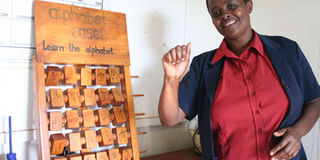Signing through it all

Busingye is a sign language instructor for Kyambogo University’s Faculty of Special Needs and Rehabilitation. (L) Busingye shows off some of the education machines/materials for those with hearing empairment photos by Abubaker Lubowa
What you need to know:
Down, not out. Losing her hearing after a bout of malaria as an adult did not deter one woman from living a fulfilling life. Bonnie Busingye shares her story with Rebecca Rwakabukoza
Bonnie Busingye has been a lecturer for almost 11 years now. The difference between her and the other lecturers is that she lost her hearing after her Senior Six final examinations when she suffered very severe malaria. “It is rare for this to happen in adults because fevers at this stage don’t cause the kind of convulsions that they do in children. Busingye likely had cerebral malaria,” explains Dr Kevina Mukulu, Kadic Hospital.
While all her contemporaries were off discovering the world in vacation and campus, Busingye, in sign language, describes the next five years of not hearing as “bad bad bad”. She was depressed and thought she was alone, but for the sister she stayed with. Her sister contacted different hospitals to understand her sister’s new condition and would eventually get in touch with Florence Namukasa, a sign language officer with Uganda National Association for the Deaf (UNAD) one Saturday in 1998.
There are different degrees of deafness, from mild to profound. The severity of Busingye’s condition is at the profound level and the only way one can communicate with her is by signing, or writing, for those who cannot sign.
What lack of hearing took from me
Busingye says that one of the things that she has found saddest about not hearing was not being able to communicate with her parents. Her father passed away two years ago and her mother is now very old. And the pain is almost tangible in the room as she signs this.
She relates the frustration of always needing a sign interpreter for every conversation with them, a new barrier that couldn’t be easily overcome because they were illiterate. She signs, “I can talk, but cannot hear. They both couldn’t write.”
Her empairment, her income-earner
Busingye, a sign language instructor for Kyambogo University’s Faculty of Special Needs and Rehabilitation, thinks that sign language should be treated in the education curriculum on the same level as local languages. It is a language for a reasonably large community, she says. Describing the silence of the community as “half-buried”, she signs about the various things that hearing people might take for granted: listening to the news, doctor visits, church services, court hearings, and taking a taxi on the street.
Busingye is very thankful for the times that the television stations have a sign language interpreter but signs that there is a large wealth of information that the community misses out on. For hospitals and courts, they are additional costs inquired for the interpreter since many places do not provide one. A mother of one herself, she opted to have an interpreter at her side during child labour.
When everyone sits, we remain standing
She humourously signs “in church, when other people sit, the deaf stand”. She continues to sign that while she uses public transport, she has learnt not to travel in the night. She narrates that once in the taxi park (Busingye is thankful for the signs listing the areas in front of the taxis), she looked for Kyambogo taxis and entered the taxi loading by the sign.
When it loaded, the taxi went to Luzira. Busingye, unable to communicate, went to Luzira and then back to the taxi park with the taxi. She laughs before she signs that she makes it a point not to travel late (in case of a double journey) and never to take a taxi from the roadside unless a UTODA person has handed her into it. When she travels with her son, a 12-year-old who just completed his Primary Seven, he signs for her.
In her lecture room, she utilises her voice as she does in this interview. In one semester, she might have about 30 students learning to sign and about 32 other students enrolled in Adult and Community education. Busingye uses an interpreter for just the first week of instruction to explain the syllabus and after that, she says “three weeks they understand.”
Her only difficulty is that she cannot hear herself and therefore cannot regulate her voice. She whispers. She shouts. She talks at a regular volume. And all the while, she has no idea about the changes. “When I return home and my head hurts, I know I shouted.”




